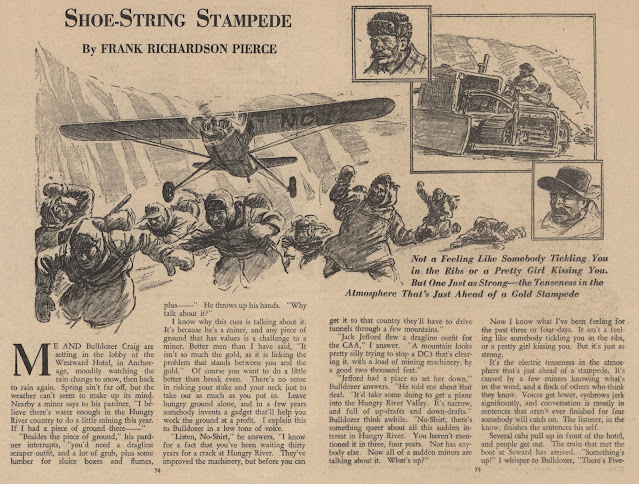Cover by Pete Kuhlhoff for Short Stories, August 10th, 1946
Step right up, ladies and gentlemen, as the carnival barker on the cover might implore, witness the incredible marvels of the scanning time machine, inside this tent, you will step nearly eighty years into the past and experience the wonders of yesteryear. Free ticket to the show here: Short Stories v196n05 (1946-08-10.Short Stories) (Darwin-DPP).cbr
Get the joined version with a scanner image signature in the .cbr, or you can easily view or download the unjoined scan in the format of your choice at the Internet Archive here.
Coming in at #5 on the list of longest running pulp magazines is Short Stories, a typically underappreciated pulp that featured an excellent variety of fiction from an excellent variety of authors. Running from 1890 to 1959 and even twice a month from 1921 to 1949. The old timers in the world of pulp collecting talk about these being available for a quarter in long boxes as a junk pulp, but a quick survey of authors in almost any issue almost reveals quite the opposite. In addition, the frequency and quality of illustration is higher than your average pulp as well.
Pete Kuhlhoff executes an interesting cover on tonight's issue. The carnival in chaos - the mob, eyes wide - some scatter, some can only stand aghast, jaws dropped in amazement. The Carnival Barker conducts. It stretched a long way from the past... SIDE-SHOW SHADOW.
I'm in, don't know about you. A good pulp cover might have you turning to that opening story without even glancing at the contents (usually the hurried first stop of the pulp reader as he walks away from the newsstand or ambles back to the porch from the mailbox).
"Lakeland. The place had a pretty name. But it was dump. I knew the smell the minute I stepped off the bus."
Prime pulp prose. And there you go, hooked already. H.L. Mencken said of the author, Theodore Roscoe, that, "Many of the so-called literati could learn a lot from Mr. Roscoe. He gets things down with amazing facility." Probably best known for his stories featuring Foreign Legionnaire Thibaut Corday, the prolific Roscoe wrote mostly adventure stories in a variety of pulp titles.
After you've finished the first story (often the best in a pulp but not always), NOW we can get back to those contents and see what other adventure or mysteries or western or crime or comedy stories await us. That's the joy of Short Stories, the variety.
A seasoned reader of the pulps might first recognize Seabury Quinn, a regular in Weird Tales, or perhaps Walt Coburn, a skilled and prolific writer of Westerns who at periods in his career averaged over 600,000 words a year in print. That's a lot. Fiction on the fly has its perils, but it has its joys too, a devil may care pace practiced by both author and reader. These days, I feel like the pulp reader of old - thumbing through the day's scans, looking for and reading good stories. We of later generations may have missed them the first time around, but it's a damned good time to be a lover of pulp.
Samples. The Singing Cowboy appeared often in the pulps. Johnny Guitar minus the gun?! DEATH MUSIC
His wiki doesn't even mention his career as an author (it's amazing how many of the pulp writer led dual lives or practiced dual occupations) and, instead, mentions only his famous career as an Olympian. But after his athletic career, Jackson V. Scholz flourished as a writer, most often writing in Sport Story Magazine from Street and Smith. You can find a long list of his works here. This is the first time I've noticed a western from Scholz, but I don't doubt he wrote others now and then.
Seabury Quinn, voyager into the mysterious, explores the dark continent and and a shapeshifting Leopardess.
I think the illustration in Short Stories is most excellent. I always like a good splash page. Shoe-String Stampede by Frank Richardson Pierce.
Or how about a little poetry. From Cowboy poet and Montanan, a regular in the Western pulps, Dan Cushman.
I leave with a few of the small and scattered illustrations. Sometimes these can be fantastic. I'll see you next time we touch down on the Darwin Scans time machine, who knows where, who knows when.
But don't the carnival clowns follow you home o.O

.jpg)










No comments:
Post a Comment